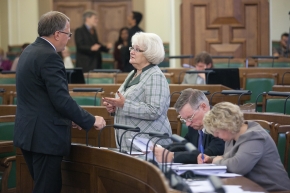 Gallery
Gallery
On Thursday, 14 June, the Saeima in the third and final reading adopted the Draft Law on the Amendments to the Law on State Pensions, stipulating a gradual increase of the retirement age.
Aimed at addressing the problems stemming from the ageing of the population, the Draft Law provides for an increase of the retirement age up to 65 for both men and women.
Aija Barča, Chairperson of the Social and Employment Matters Committee responsible for the Draft Law, explained that MPs have succeeded not only in adopting the amendments within the planned deadlines but also in finding a compromise solution that is acceptable for all stakeholders. “We have agreed on a more gradual increase of the retirement age, provided for preferential treatment of disabled children’s parents and introduced an option of early retirement without a time limitation.”
The retirement age will be raised from 62 to 65 more gradually than planned before, namely, in several steps of three months until the reform is completed in 2024. In the first reading the Draft Law provided for a swifter increase of the retirement age and completion of the reform by 2020. The amendments also provide for early retirement without a time limitation.
The Draft Law will in the long term avert the social budget deficit that otherwise would reach LVL 1.43 billion by 2030. With the adoption of the Draft Law and switching the financing of supplements to pensions from the social budget to the basic budget as of 2014, it is expected to have a social budget surplus of LVL 1.43 billion by 2030.
Advocating the need for the amendments, Arvils Ašeradens, Deputy Chairman of the Social and Employment Matters Committee, pointed out that the population of Latvia is markedly shrinking and ageing so that the demographic burden is ever increasing. There are now approximately 130 working people per 100 pensioners. Similar trends are evident in other European countries. Many of them, including Estonia and Lithuania, plan to reform their pension systems and raise the retirement age to 65 years or even more.
The amendments also provide for an increase of the minimum insurance period, which grants the right to receive an old-age pension. In the transition period 2014-2024, the minimum insurance period is set at 15 years. As of 2025 the minimum insurance period to qualify for an old-age pension is planned to be further increased to 20 years. Currently a person is entitled to an old-age pension if he or she has made social security contributions for a minimum period of 10 years.
With the amendments the Saeima has also reduced the minimum insurance period applicable to parents of five and more children, as well as parents raising a disabled child.
According to the new wording of the Law, early retirement (5 years before the statutory retirement age) will be granted to the aforementioned groups on the condition that their insurance period has reached at least 25 years, instead of 30. The provision has been changed taking into account how difficult it is to reach the insurance threshold of 30 years for parents who for at least eight years have been taking care of a disabled child or of five or more children. The previous provision excluded many of the target parents simply because they could not meet the insurance period criterion.
Apart from the aforementioned changes, the Law on State Pensions includes numerous other modifications and adjustments.
Saeima Press Service







